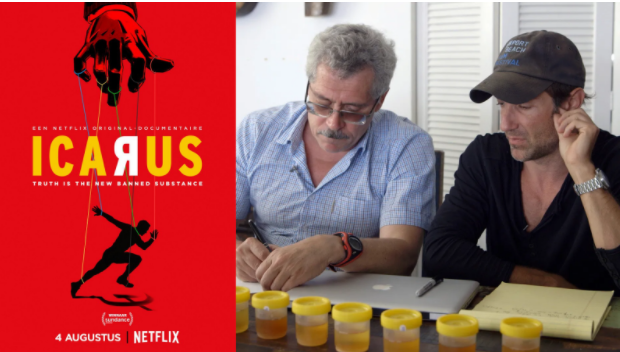“Icarus”: How One Man’s Truth Forever Changed the World of Athletics
The anti-doping system in athletics was, and still is, “bullsh*t.” That’s the consensus reached by Director Bryan Fogel’s eye-opening documentary, “Icarus” (2017), as it uncovers the truth behind the wins of beloved Russian champions.
In order to reveal the flaws in the anti-doping system in sports, Fogel begins a doping program for himself, in hopes of taking the steroids’ in a way that will not be detected by drug tests. This leads him to an unexpected friendship with the former head of Russia’s National Anti-Doping Laboratory, Grigory Rodchenkov. The fun, however, soon ends as Grigory gets roped into catastrophic doping allegations against Russia.
In a scandalous turn of events, Rodchenkov exposes the decades-long corruption existing within Russian athletics, proving the ineffectiveness of the World Anti Doping Agency (WADA). He provides hard evidence for the government’s illegal interference with the 2014 Sochi Olympics and the national team’s constant dependence on performance-enhancing drugs to achieve positive results.
The documentary takes on an extraordinary perspective as it is centered around Rodchenkov, the only man with the ability to destroy both sides in question—Russia and the World Anti Doping Agency (WADA). The storytelling in this film is phenomenally executed, utilizing Rodchenkov’s position to produce an enthralling masterpiece.
The message conveyed in “Icarus”, however, goes beyond what is explicitly stated. Fogel’s staggering film repeatedly references Rodchenkov’s fascination with George Orwell’s 1984, alluding to the suffocating totalitarianism experienced by Russia’s citizens. Parallels between the two works become stronger as we witness the implied assassination of Rodchenkov’s friend, Nikita Kamaev, as well as Rodchenkov’s own struggle to escape the Federal Security service (FSB).
The references to Orwell add an unexpected layer of depth and complication to the overall narrative, blurring the lines between “good” and “bad”. It forces us to question an individual’s actions, the motives behind those actions, and whether those actions were performed by choice. It makes us wonder when “the truth” is really the truth and what is hiding behind the propaganda-ridden information fed to us by power-hungry governments.
These dark themes and intense moments should not deter you from watching the film, however, as many parts of the film are actually quite lighthearted—we often get to witness Rodchenkov’s hilarious conversations with Fogel as well as guest appearances from Fogel’s dog, Max. These rare, feel-good moments add a humanistic touch to the ominous energy felt throughout the rest of the movie and are what make this film a delight to watch.
Regardless of whether you’re a sports enthusiast or not, “Icarus” will never fail to keep you on the edge of your seat. Embark on a geopolitical roller coaster wherein Fogel, through his investigation of doping in Russian athletics and friendship with Rodchenkov, changes athletics forever.

